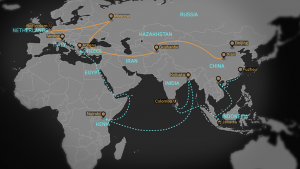By Dorcas Cheung
HONG KONG—When Mrs. Carrie Lam Cheng Yuet-ngor began her five-year term as Hong Kong Chief Executive in 2017, she promised to bring Hong Kong to “even greater heights” by improving livelihood.1 Although Lam didn’t clarify in her inauguration speech what she meant by “livelihood”, the policies she executed thus far showed that her administration mainly focuses on capitalism. Her narrow interest doesn’t address all aspects of livelihood, which the English Oxford Dictionary defines as “ a means of securing the necessities of life.”2 As Hong Kong’s first female chief executive, Lam, surprisingly, hasn’t touch upon issues concerning women, such as health education for girls, gender equality, and wellbeing of women. However, her economic-centered governance may shift focus slightly for her remaining time in office.
A government source revealed that there is a proposal of extending maternity leave in the upcoming annual policy address by Lam on Wednesday, October 10, 2018. Currently, pregnant women in Hong Kong are only entitled to a ten-weeks-long maternity leave, which is four weeks less than the International Labor Organization standard.3 The ILO declares on their website that “expectant and nursing mother requires special protection to prevent harm to their or their infant’s health…at the same time, they also require protection to ensure that they will not lose their job.” It is extremely important for Chief Executive Carrie Lam to prioritize this proposal and reform Hong Kong’s existing policies on maternity leave; Hong Kong women should be allowed to take more than 14 weeks off after giving birth due to numerous benefits for the well-being of mothers and long-term public good.
In the past few years, the number of mental health awareness campaigns have skyrocketed. Whether these awareness events are held at a local or national level, they all share the goal of educating the public about the complexity of mental illness, removing stigma around it, and improving support to those suffering from mental health issues. However, maternal mental health, in particular, is not receiving as much attention as it should. According to Maternal Mental Health Alliance (MMHA) more than one in ten women develop a mental illness during perinatal.4 MMHA, is a U.K. coalition with a vision to improve mental health care for mothers and it defines perinatal as the period of time from pregnancy to the first year after birth. The prevalent of perinatal mental illnesses, which includes depression, perinatal obsessive compulsive disorder, and posttraumatic stress disorder, is a clear signal that women are not receiving the support they need to take care of themselves and their babies. Not only are women lacking emotional support, many women also find that they have no time to recover before returning to the workforce. Mother-to-be Erica Wong expresses that her goal to breastfeed at home for at least six months, a recommendation given by the World Health Organization, is made impossible by the short maternity leave in Hong Kong.5 Despite her expected delivery date is four months away, she is beginning to feel anxious and concerned about her baby’s health. As a store supervisor, Erica will not be able to leave her position during work even for 15 minutes to pump milk. She knows the countless benefits of breastfeeding because breast milk offers the ideal nutrition for infant growth; nevertheless, she won’t be able to provide the best to her child if she has to keep her job.6
A direct solution to solve Erica’s and the problem of many working mother is to extend maternity leave. According to ILO, “longer maternity leave is associated with longer breastfeeding periods for new mothers.”7 Also, increasing the length of maternity leave results in lower rates of premature births, pregnancy and child mortality.8
“Maternity leave policies tell an intimate story about how societies prioritize families,” Nitzia Logothetis, psychotherapist and founder of Seleni Institute, explains.9 In comparison to other countries, Hong Kong is cruel, strict, and not generous in term of giving families with newborn time off from work. South Korea and Singapore, two of the fastest growing metropolitan areas, offer 13 and 16 weeks, respectively, with 100% of salary covered on leave.10 In 2012, China increased maternity leave to 14 weeks, also with 100% wage coverage. Yet, Hong Kong has not updated its maternity leave policies since 1970 and public citizens aren’t fully aware of strings tie to them. For example, employees are only entitled to the ten weeks leave only if they have been working for the company for more than 40 weeks.11 In view of the conclusion drawn from well-studied research, which explains the significant positive effects maternity leave has on the health of children and mothers,12 Hong Kong needs to impose new legislation immediately to extend leave to at least 14 weeks, the global standard.
Employers oppose such policy change with fear that it will decrease workforce and harm their business revenue. However, these employers are lacking long term vision because “Hong Kong is short of babies”.13 Secretary for Labor and Welfare, Dr. Law Chi-kwong, pointed out that fertility rate in Hong Kong has been declining dramatically in the past decade. Low fertility rate is unfavorable to Kong Kong economy and could lead to wider social problems. Increase paternity leave and family-friendly working conditions are suggested methods to tackle the problem.14 Whether the government should subsidies to pay for family leave policies is another issue, but Hong Kong should first put down its “capitalistic greed against humanity”, as a British mother describes,15 and treat mothers better.
It is time to increase public awareness on maternal mental health. We owe the mothers in Hong Kong too much.
Endnotes:
- Cheung, Tony. “Carrie Lam Talks Up Unity, Opportunities In National Day Speech”. South China Morning Post, 2017, https://www.scmp.com/news/hong-kong/politics/article/2113541/unite-and-seize-opportunities-hong-kong-leader-carrie-lam. Accessed 4 Oct 2018.
- “Livelihood | Definition Of Livelihood In English By Oxford Dictionaries”. Oxford Dictionaries | English, https://en.oxforddictionaries.com/definition/livelihood. Accessed 4 Oct 2018.
- “International Labour Standards On Maternity Protection”. Ilo.Org, https://www.ilo.org/global/standards/subjects-covered-by-international-labour-standards/maternity-protection/lang–en/index.htm. Accessed 4 Oct 2018.
- “Maternal Mental Health Alliance | Awareness Education Action”. Maternalmentalhealthalliance.Org, https://maternalmentalhealthalliance.org/. Accessed 5 Oct 2018.
- Lam, Jeffie, and Phila Siu. “Can Hong Kong Bridge Maternity Leave Gap Without Riling Businesses?”. Hong Kong Economy- Parenting: Newborns To Toddlers, 2018, https://www.scmp.com/news/hong-kong/hong-kong-economy/article/2167028/maternity-leave-hong-kong-can-chief-executive. Accessed 5 Oct 2018.
- Ibid.
- “International Labour Standards On Maternity Protection”.
- “Breastfeeding Overview”. Webmd, https://www.webmd.com/parenting/baby/nursing-basics#1. Accessed 5 Oct 2018.
- Logotheis, Nitzia. “The Importance Of Maternity Leave For Maternal Mental Health”. Seleni Institute,https://www.seleni.org/news-updates/2018/3/28/the-importance-of-maternity-leave-for-maternal-mental-health. Accessed 5 Oct 2018.
- Lam, Jeffie, and Phila Siu.
- “The Ultimate Guide To Maternity Leave In Hong Kong”. Healthymatters.Com.Hk, 2018, https://www.healthymatters.com.hk/ultimate-guide-maternity-leave-hong-kong-lawyer-approved/. Accessed 5 Oct 2018.
- Wallace, Kelly, and Jen Christensen. “Paid Leave Benefits Children And Families, Studies Say”. CNN, 2015, https://www.cnn.com/2015/10/29/health/paid-leave-benefits-to-children-research/index.html. Accessed 5 Oct 2018.
- Cheung, Elizabeth. “Why Hong Kong Really Needs To Start Having More Babies”. Soceity- Explainer, 2018, https://www.scmp.com/news/hong-kong/community/article/2159874/heres-why-hong-kongs-low-fertility-rate-poses-threat-its. Accessed 5 Oct 2018.
- Leung, Kenis, and Jeffie Lam. “‘Fully Subsidise Employers Under Plan To Extend Maternity Leave’”. Hong Kong Economy- Parenting: Newborns To Toddlers, 2018, https://www.scmp.com/news/hong-kong/hong-kong-economy/article/2166156/hong-kong-government-should-fully-subsidise-costs. Accessed 6 Oct 2018.
- Lam, Jeffie, and Phila Siu









Be First to Comment